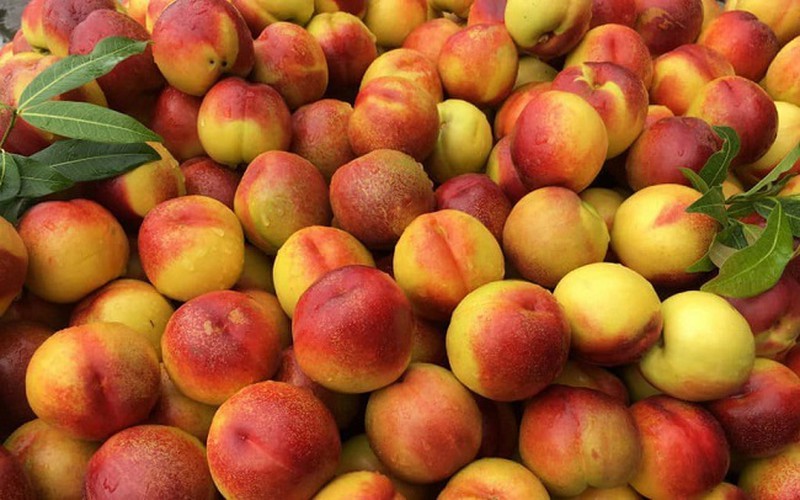Peaches are a very popular fruit that not only have a sweet, delicious taste but also contain many nutritional values that are good for human health. Below is useful information about peaches and the benefits they bring to health.
1. Peaches and popular varieties on the market
Peaches are a type of fruit with the scientific name Prunus Rosaceae. Peaches have a smooth or hairy outer skin, juicy flesh and hard seeds. Peaches are usually round or slightly flat in shape, with colors ranging from white, yellow to pinkish red depending on the variety and ripeness. The flavor of peaches can be sweet or sour, suitable for eating fresh, making jam, cooking or baking.

Peach is a favorite and popular tropical fruit.
Peaches are grown mainly in temperate and subtropical climates such as China, Japan and many European and American countries.
There are many different types of peaches grown and sold on the market, here are some popular types:
- Hairy peaches: This type has a soft, hairy outer skin and sweet flesh; the flesh is easy to separate from the seed, often used to eat fresh;
- Smooth peaches: This type has a smooth, hairless skin; sweet and fragrant taste, suitable for eating fresh or used in desserts;
- Yellow peaches: This is a popular type of peach in markets and supermarkets, the flesh is yellow, sweet or slightly sour;
- White peaches: The flesh is white, sweet, less sour than yellow peaches; often preferred to be eaten fresh.
These types of peaches can vary in size, color and flavor, depending on growing conditions and tree varieties.
2. What are the health benefits of peaches?
Not only known for its delicious taste, peaches are also a fruit that provides many nutritional values that are very good for health:
- Weight loss: With low calories and rich in water, peaches are a good choice for a weight loss diet, helping to effectively reduce cravings;
- Beautify the skin: Vitamin C and other antioxidants in peaches help improve skin health, slow down the aging process, and fight the effects of UV rays on your skin;
- Protect the eyes: Vitamin A in peaches is an important factor for the development and maintenance of eye health, helping to reduce the risk of problems such as dry eyes, vision loss and cataracts. One peach can meet 15% of your daily vitamin A needs;

Peaches have many effects in enhancing eye protection.
- Improve cardiovascular health: Peaches are a rich source of potassium and iron, which help increase blood circulation, regulate heart rate, reduce blood cholesterol, improve cardiovascular health and reduce the risk of cardiovascular diseases;
- Prevent digestive disorders: A peach contains 6 – 9% of the fiber the body needs each day. The fiber in peaches helps improve digestive function, prevent constipation and easily remove waste from the body;
- Reduce the risk of cancer: polyphenols in peaches have been shown to inhibit the growth and spread of cancer cells, especially breast cancer;
With a variety of nutrients, adding peaches to your daily diet can help you improve your overall health: Lose weight, beautify the skin, protect the eyes, improve cardiovascular health, prevent digestive disorders, reduce the risk of cancer… That is also the reason why peaches are very popular and appear frequently in the diet of every family.
3. Things to note when eating peaches
It can be seen that peaches are a delicious and nutritious fruit, containing many essential nutrients for the body. However, eating them the wrong way can be harmful to your health. Therefore, please note the following:
Wash peaches before eating: Because peaches have a layer of fluff, washing peaches before eating to remove fluff and dirt is very important to avoid causing itchy throat and allergies;
Remove peach pits: Peach pits cannot be eaten because they contain natural cyanide – a poison that can be harmful to health if eaten in large quantities;
Choose and preserve peaches: To ensure quality, you should choose soft, plump peaches without bruises, cracks or signs of damage.
In addition, health experts recommend that the following people should not eat peaches:
- People with diabetes: Peaches have a high natural sugar content (every 100 grams of peaches contain 7 grams of sugar). Therefore, people with diabetes should not eat this fruit;
- Pregnant women: Pregnant women are advised not to eat too many peaches because this fruit is hot and can easily cause bleeding. They should only eat about 2-3 fruits/week to avoid affecting the pregnancy;

Pregnant women are advised not to eat too many peaches during pregnancy.
- People with internal heat: People with internal heat with symptoms such as nosebleeds, dry mouth, sore throat should limit eating peaches, only eat 2-3 times/week and do not eat more than 2 fruits at a time.
The above information hopefully can help people in choosing and enjoying this fruit scientifically, bringing the best effect to health.





